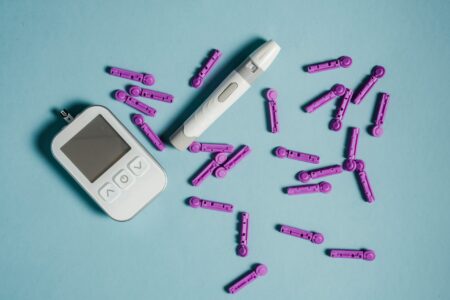Anyone who is starting a ketogenic lifestyle is concerned about his or her ketone levels. It makes sense, right? After all, getting this kind of objective data is the definitive way to tell that you are on the right track.
Seeing your ketone levels increase offers you a boost in motivation. It tells you that your body has successfully burned its glycogen stores and is now utilizing fat for fuel. With that, it’s essential to know the optimal range of ketones for ketosis.
If you want to learn more about ketone levels, what’s normal and what’s not, read this detailed guide.
What Is the Normal Range for Ketones?
Testing for ketones is usually recommended for individuals with diabetes, to make sure that they are not at risk of ketoacidosis. However, it’s also vital for people who want to achieve nutritional ketosis to test their ketone levels. That way, they know their progress 1.

Unless you are in ketosis, your blood ketone concentrations should only be at 0.1 mmol/L and not higher than 0.3 mmol/L 2. Higher readings (that indicate that you are out of ketosis) imply different things:
You are eating too many carbohydrates.
Carbohydrates significantly impact your blood glucose levels more than protein and fat 3. High blood glucose doesn’t just kick you out of ketosis, it also affects your health.
You are eating too much protein.
The rule to get into nutritional ketosis is that one should consume moderate amounts of protein. This protein requirement is similar to the protein requirement of someone who is on a standard diet 4, 5.
According to the Virta Health team, a person will need between 1.5 and 1.75 grams of protein per kg of reference body weight to maintain lean body mass while in nutritional ketosis. Too much protein can decrease ketones since it moderately stimulates insulin production 5. Insulin lowers ketone production 6.
You are under stress.
Stress affects your metabolism in that it increases your insulin levels 7, 8. And as you already know, insulin strongly suppresses ketogenesis or the production of ketone bodies 9.
What Is the Optimal Ketone Level for Ketosis?
There are two types of ketosis – nutritional ketosis and starvation ketosis.
The optimal blood ketone concentration for nutritional ketosis falls anywhere between 0.5 and 2 mmol/L. For starvation ketosis, ketone concentrations tend to be higher – between 5 and 10 mmol/L. But since we are focusing on nutritional ketosis in this guide, you should only aim for 0.5 and 2 mmol/L 2.

If one of your goals for achieving ketosis is weight loss, the sweet spot for maximum results is anywhere between 1.5 – 3 mmol/L 10.
Reaching optimal blood ketone levels in nutritional ketosis has many benefits for your health and fitness. You will experience some of these effects as you achieve ketosis right away while other effects are long term.
Since beta-hydroxybutyrate (BHB) is the predominant ketone body in the blood, we are going to look at some studies where we can appreciate its impact on your body:
Reduces visceral fat mass – A study published in 2017 revealed that oral administration of BHB leads to better body fat control. BHB reduces adipocyte (fat cell) volume 11.
Lowers blood glucose – BHB ketone drinks, whether these are ketone esters or ketone salts, raise concentrations of blood BHB in humans and lower blood glucose concentrations 12.
Protection against brain degeneration – While its mode of action is unclear, BHB protects against neurodegenerative diseases where energy deficit plays a role. Examples of these neurodegenerative diseases include Alzheimer’s Disease, Parkinson’s Disease, and Amyotrophic Lateral Sclerosis 13.
While testing your ketone levels using a blood meter is a definitive way to tell whether you are in ketosis, the downside is that testing strips are pricey. Also, some people dislike the idea of pricking themselves.
Fortunately, you can also test your ketone levels with urine strips. By using urine strips, you will be able to measure the ketone body acetoacetate.
However, do note that there is great variability between blood ketones and urine ketones since your hydration status can affect urine ketone levels. Dehydration increases urine ketones while proper hydration decreases it. That is why blood ketone testing is highly preferred over urine ketone testing 14.
What Is a Dangerous Level of Ketones?
Ketones can rise to dangerous levels, making your blood too acidic. This condition is known as ketoacidosis, and it is a common complication of Type 1 Diabetes – although it can occur in individuals with Type 2 Diabetes 15.

While nutritional ketosis is characterized by blood ketone concentrations of 0.5 and 2 mmol/L, ketoacidosis is characterized by high ketone concentrations that can exceed 20 mmol/L 2.
Ketoacidosis occurs when blood sugar levels remain too high for a long period of time. For instance, a diabetic patient who hasn’t complied with his or her insulin therapy. Since insulin helps glucose enter the cells, a lack of insulin forces your body to utilize fat for fuel instead. Thus, the excessive buildup of ketones in the blood.
A lot of people ask whether ketosis can lead to ketoacidosis. Please bear in mind that a well-formulated ketogenic diet will not cause your ketones to exceed 5 mmol/L (due to negative feedback inhibition) 2.
However, people without diabetes may be at risk for ketoacidosis if he or she also suffers from alcoholism or alcohol dependency, starvation, or an overactive thyroid 16.
Where should my ketone levels be?
For nutritional ketosis (by following a well-formulated ketogenic diet), your ketone levels should be between 0.5 and 2 mmol/L. If you want to optimal ketosis, aim for 1.5 – 3 mmol/L.
Ketone Levels Chart
We’ve been talking about ketone numbers and perhaps by now, you’re feeling a bit confused. Don’t worry; we’ve created a simple chart that shows different ketosis levels.
Hopefully, this will help motivate you to stay within the acceptable range of ketones for ketosis.
| Metabolic State | Ketone Levels (mmol/L) | What You Should Know |
| Non-ketotic state | 0.1 – 0.3 mmol/L | Ketogenesis operates at idle.
Your carbohydrate consumption is enough to trigger an increase in your blood glucose. |
| Nutritional ketosis | 0.5 – 2 mmol/L | You are following a low-carbohydrate, high-fat diet. |
| Post-exercise ketosis | 3 – 5 mmol/L | Limiting your carbohydrate intake before exercising increases ketone levels.
This increase in ketones lasts only for a short time. |
| Starvation ketosis | 5 – 10 mmol/L | This is a result of fasting or a total absence of calorie intake.
Not sustainable long term. |
| Ketoacidosis | Above 20 mmol/L | Usually happens with poorly managed Type 1 and Type 2 Diabetes.
Can also result from starvation, alcoholism, and an overactive thyroid (without consuming enough carbohydrates) |
Conclusion
Checking your ketone levels can be extremely helpful for boosting your motivation, especially if you are just getting started in your keto journey.
You’ll also be able to compare your ketone readings with how you feel inside. Do you feel great? Are you able to sleep better? Have your food cravings diminished?
Being in nutritional ketosis allows you to experience the positive effects of beta-hydroxybutyrate (the predominant ketone body in the blood) such as reduced visceral fat, improved brain health and better blood glucose control.
Takeaways
- When you are not in ketosis, your ketone levels typically range from 0.1 mmol/L – 0.3 mmol/L.
- Stress and high dietary carbohydrate and protein intake can take you out of ketosis.
- For nutritional ketosis, ketone levels range from 0.5 – 2 mmol/L. The optimal range (“sweet spot”) is between 1.5 – 3 mmol/L.
- Testing for blood ketones is the best way to track ketosis since the readings are more accurate.










![Juicing for Weight Loss: Everything You Need to Know [Plus Recipes]](/wp-content/uploads/2019/08/Juicing-for-Weight-featured-image.jpg)










My keto breath meter is reading 9.95 for the last 3 wks. Help please
Very helpful. Exactly what I needed to know. I bought a blood Ketone monitor to ensure I was in the right spot after starting the Keto diet.
I just started Keto and got my urine test as strips; I read that when first starting keto your urine levels can be higher? I’m at 4 compared to your chart provided, I wish there was more clear info on how interpet the results as a complete beginner and what my next steps should be!
Very helpful information about ketosis levels.. I have been trying to find a simple comprehensive explanation. Thank you for sharing.
So for Keto do I want my strip to read in the small or moderate levels? Today it was in the large level – kinda freaked me out.